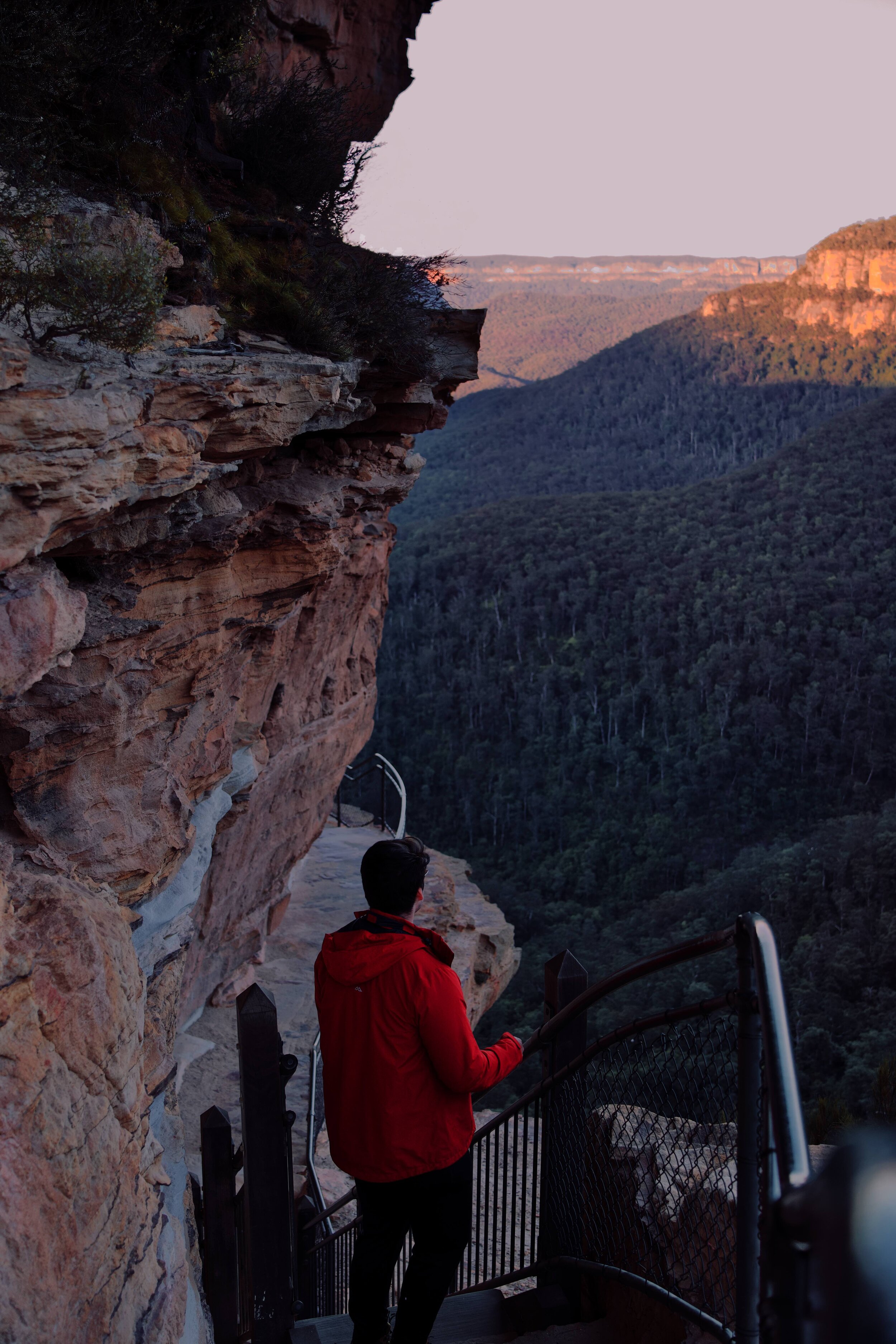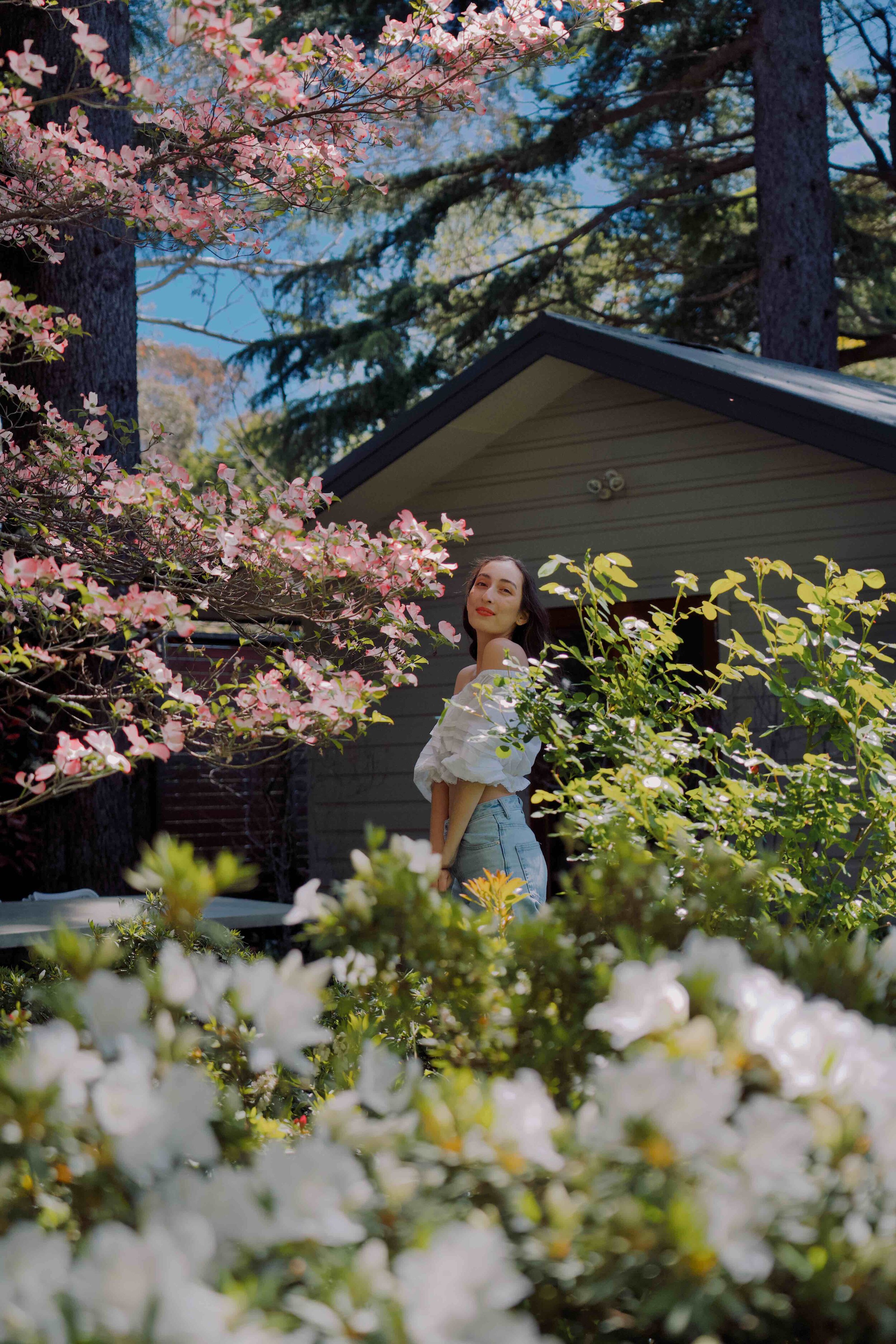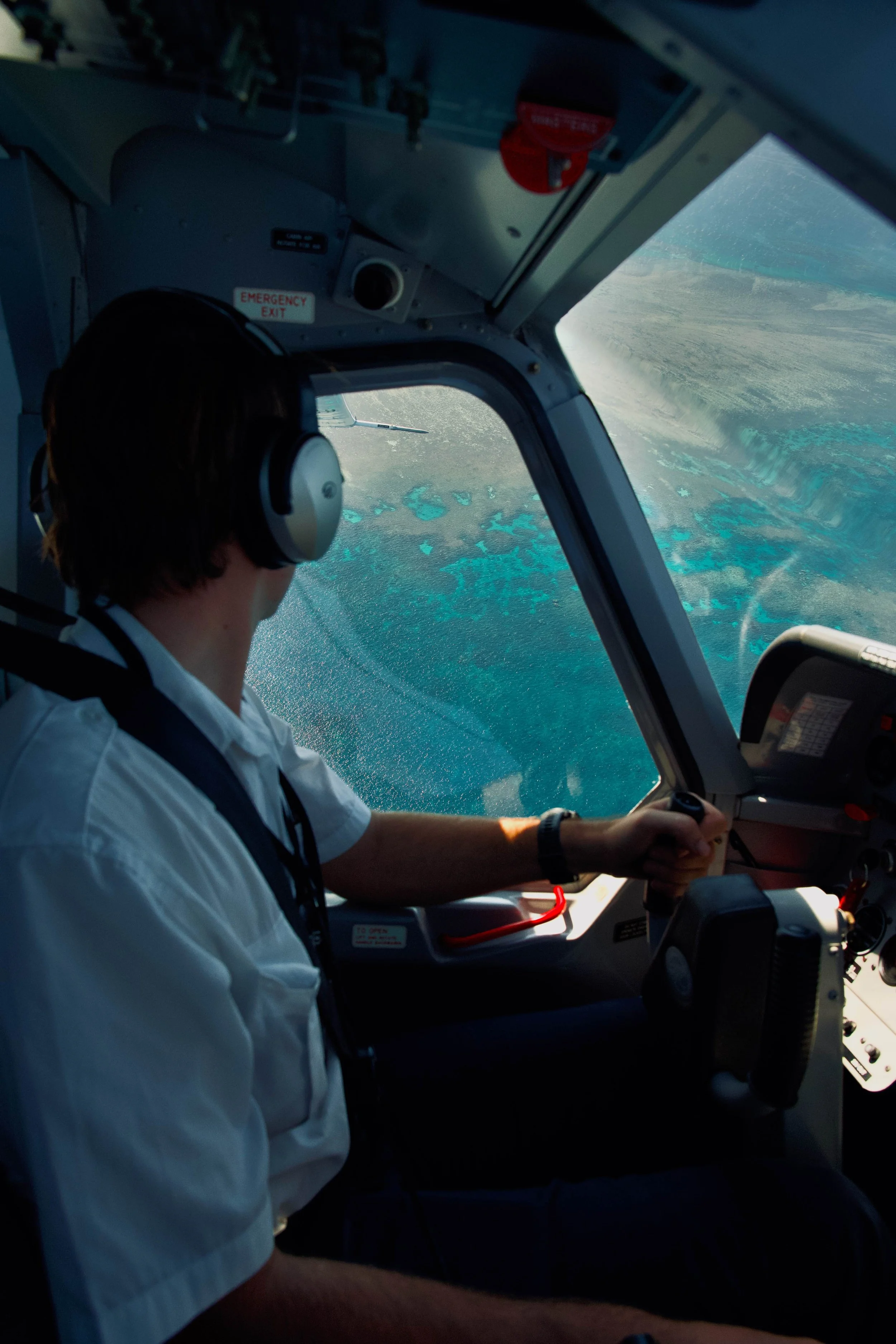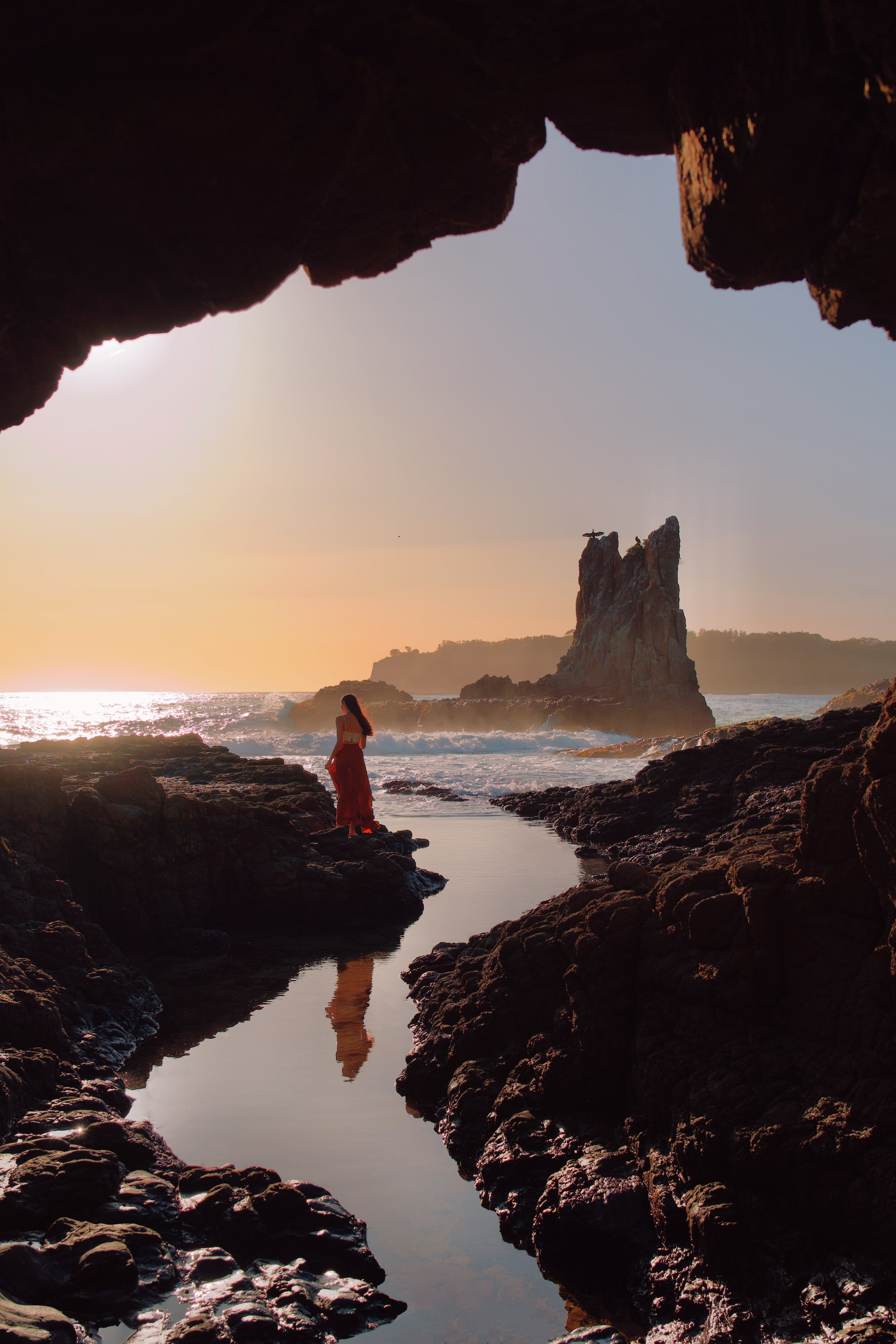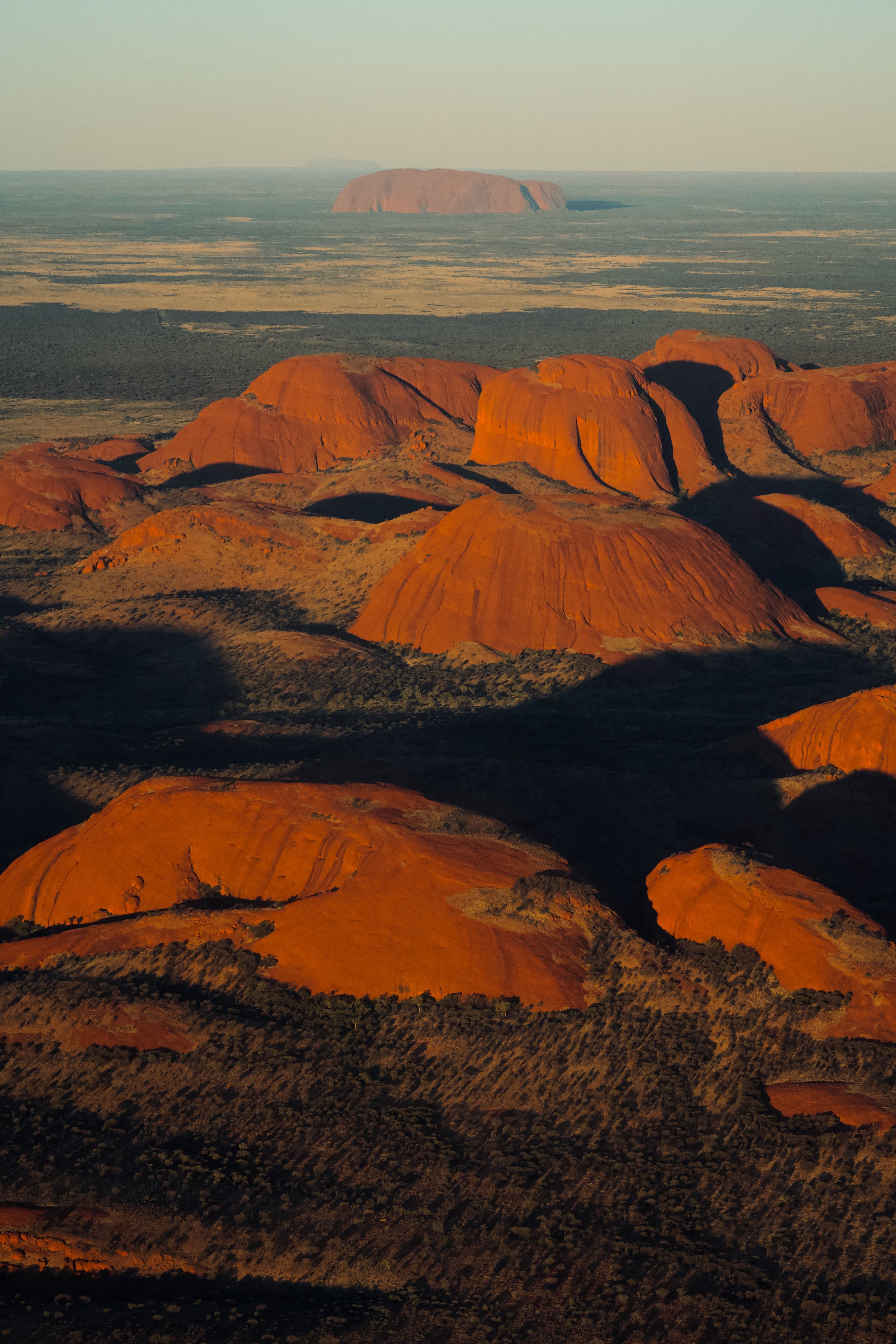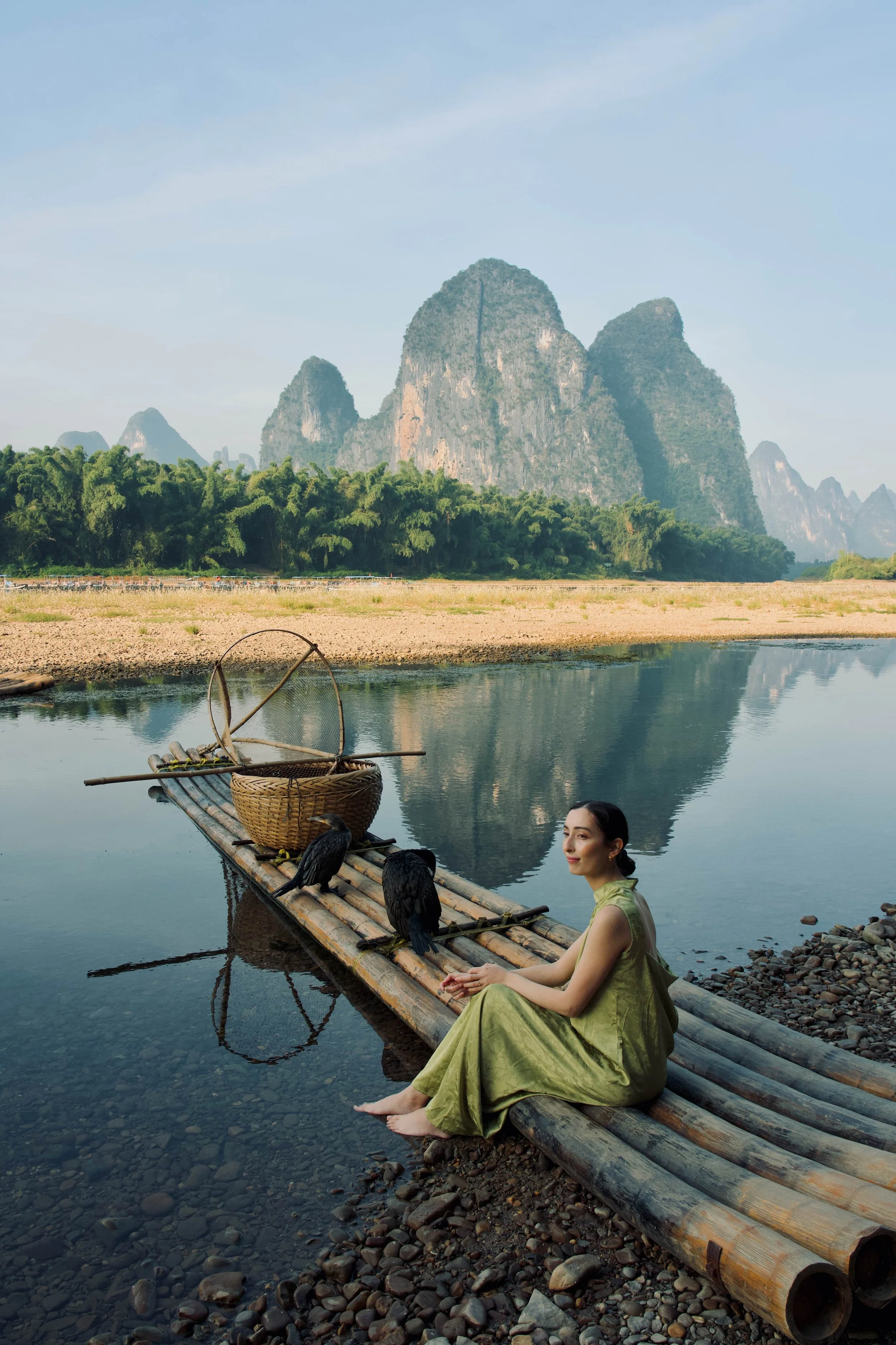An epic guide of 11 things to do in the Blue Mountains
by ling and jace
The ‘Blue Mountains’ are located within the Country of the Dharug and Gundungurra people. We acknowledge and pay our respects to the Traditional Owners.
home / back to australia
Cahill’s lookout at sunset
We’ve spent countless days between the trees and rocky cliffs of the Blue Mountains, taking dirt roads and hiking down to waterfalls.
There are endless things to do in the Blue Mountains—bush walks, sunrise and sunset lookouts, gardens in bloom, good food and slow days inside cosy accommodation. It’s the perfect place for day trips from Sydney, refreshing weekend getaways, and longer stays if you have the time.
First light over the valley on the Wentworth Falls Track
Flowering rhododendrons
How to get to the Blue Mountains
By car
From Sydney, the Blue Mountains are an easy 1.5-2hr drive avoiding tolls. Take the Western Distributor/A4 out of the city and onto the A44/M4, then follow the Great Western Highway/A32. Alternatively, a longer but more scenic route is via the B59 (Bells Line of Rd), however, this road can occasionally be closed after heavy rains due to flooding and landslides.
We’d really recommend driving if possible, as it gives you the flexibility to be able to visit any attraction in the Blue Mountains, especially as some bush walks and hikes are only accessible by car.
By train
The Sydney train network is well connected to the Blue Mountains. There are several train stations in the Blue Mountains region, the main ones being Springwood, Wentworth Falls, Leura, Katoomba, Blackheath and Mount Victoria. The full ride from Sydney’s Central Station to Mount Victoria takes 2 hrs 18 mins and costs $6.20. Once there, you can use taxis to get around, or you can take the local buses.
Roadside view on the way to Lockley’s Pylon
Accommodation in the Blue Mountains
Most of the attractions in the Blue Mountains are located around Leura, Katoomba and Blackheath, so we’d recommend finding accommodation in these areas. There are plenty of places to stay, from hostels, motels, and hotels, all the way up to the historic Hydro Majestic Blue Mountains and the Palais Royale.
There are also many affordable Airbnbs to choose from all across the Blue Mountains. We stayed in this three bedroom cottage in Blackheath for less than $50 each per night (for 5 people). We find that Airbnb accommodation in the Blue Mountains is generally very cosy and modern.
Inside our cottage Airbnb
When to visit the Blue Mountains
The best time of year to visit the Blue Mountains is in either spring or autumn, before it gets too hot or cold. Our last long weekend trip was in October, which was the perfect time of year for all of the attractions listed below—recent rain had filled the waterfalls, the rhododendrons were in full bloom, and the days were starting to get longer for sunset hikes.
Black cockatoo at Wentworth Falls
View from Lockley’s Pylon
11 BEST THINGS TO DO IN THE BLUE MOUNTAINS
Hike to Lockleys Pylon
Distance: 7km return
Time: 2 hours return
For one of our favourite afternoons in the Blue Mountains, we drove off onto a dirt road, hoping our tiny car would make it. The route to Lockley’s Pylon is one of the few trails that doesn’t descend into the valleys—instead it follows the top of the mountains to a spectacular peak. There’s a steep drop at the end of the trail, with high, 360° views across the eucalyptus forests of the Grose Valley and the orange sandstone cliffs of Mount Hay and Mount Banks.
We’d recommend going in the late afternoon and taking some time at the peak to enjoy the scenery in golden light.
The Lockleys Pylon walking trail is 7km return and fairly easy. It’s quite flat the whole way through, except for some slight elevation here and there. Allow about 2 hours in total (return). We’d recommend proper footwear, sun protection and plenty of water. The most difficult part of the walk is sun exposure, but otherwise, the track is well defined and even. Hiking poles are optional but useful, as always.
You can park anywhere on the side of the road near the start of the walking trail.
One thing to note is that Lockleys Pylon walking trail is only accessible by car, and the last 6km of the drive on Mount Hay Road is an uneven, dirt road. Take it real slow. We managed it in a 2010 Ford Focus, but it took almost 20 minutes and a lot of stress. We’d really recommend driving something prepared for offroading, if possible.
The walking trail is usually full of eucalyptus gums, wildflowers and wild animals, but when we visited in October 2020, it was in a state of regrowth after the 2019-20 bushfires that tore through the area. There were shoots just starting to grow over burnt tree trunks. There are actually several other walking trails in this valley that we’d recommend, but a lot have been closed as a result of the bushfires.
Check the NSW National Parks website for alerts on trail closures.
Sunset on the track to Lockley’s Pylon
2. Follow the trail down to Wentworth Falls
Distance: 1.4km return
Time: 1 hour return
One morning we took in all of the sunrise colours on a hike down into the valley. We decided to get out early to avoid the crowds, and made it just in time for a red glow on the mountains.
The Wentworth Falls track is probably the most well-known and scenic walk in the Blue Mountains. Starting at the Wentworth Falls picnic area (where you can also find parking), the track descends along the cliff face. The descent itself is one of the most scenic parts of the track, but the main attraction is a natural pool at the base of the 100m tall Wentworth Falls.
It’s not a long walk—it’s only 1.4km return and takes about an hour in total—but the trail is very steep, and there are 200 steps carved into the rock cliff face to get to the bottom. We’d recommend wearing good footwear as some steps have been worn down and are occasionally wet from the waterfall.
Wentworth Falls isn’t the only attraction in the valley. There are several lookouts within walking distance of each other like the Jamison Lookout (which is right next to the Wentworth Falls picnic area and carpark), Fletchers Lookout, Rocky Point Lookout, and Princes Rock Lookout.
There are also many other walks you can take here, like the Eagles Nest Fletchers Rock Lookout track which connects to the Princes Rock Lookout track, back up to the Wentworth Falls picnic area carpark. We’d recommend taking this track instead of going back up the Wentworth Falls track when you return to the carpark—it doesn’t add much more time, and you get a chance to see two more lookouts and part of the Undercliff Track too, which is a cliffside walk carved into the mountain.
Wentworth Falls track running along the cliff face
Pools at the base of Wentworth Falls
3. See the Rhododendron Gardens in bloom
When they’re in full bloom, rhododendrons are a huge attraction in the Blue Mountains, with the whole area becoming incredibly colourful from October-November.
The Campbell Rhododendron Garden is a beautiful place to spend time in the Blue Mountains. It's a luscious and ambitious garden that offers a unique display of exotic plants amongst the Australian native bush. The exotics were planted directly into the native bushland to create an interesting blend of flowers within the garden, which also meant that no trees were cleared to make way for the site.
There's something to see all year round, but the best time to visit is in October and November when the rhododendrons and azaleas are flowering.
There's a carpark at the entrance and a small admission fee of $5 which helps the Blue Mountains Rhododendron Society maintain the garden.
Campbell Rhododendron Garden in October
4. Stargaze at Govetts Leap Lookout
One night we left the fireplace in our cottage and headed out to see the stars. The skies in the Blue Mountains are a beautiful attraction, and on a clear night can be easily seen from most of the lookouts.
Govetts Leap Lookout is one place we always recommend in the Blue Mountains. By day, you’ll get stunning views of Mount Banks and Mount Hay, and by night, the skies can be clear enough to make out the Milky Way. When we were there, we were lucky enough to see a huge red moon rising.
Govetts Leap Lookout is also an access point for several walks in the Blue Mountains. You’ll be able to see from the map that the walks can be quite long, but the main lookouts along the way are actually quite close to Govetts Leap Lookout, so it’s easy to visit a few of them while you’re there.
If you take the path to the right, you’ll find yourself on the 3km Cliff Top Track which can take you all the way to Valley View Lookout and Evans Lookout (where you can also continue onto the much longer Grand Canyon track). Along the way, you’ll be able to enjoy views of the cascades and cliff faces of Govetts Leap, and stop off at Barrow Lookout for more scenic views.
There’s also the Williams Track, where you can reach Breakfast Rock, and the Fairfax Heritage Track which starts a little further down the road from Govetts Leap Lookout. From there, you can reach the George Phillips Lookout.
5. Anvill Rock & Wind Eroded Cave
Anvill Rock is another lookout that offers breathtaking 360° views across the Blue Mountains National Park forests, Mount Banks and Mount Hay. If you visit at sunset, there are barely any people around, and you’ll catch some pastel pink tones setting behind the cliffs.
A short 5 minute walk away is the Wind Eroded Cave. It’s is exactly what it promises to be—a cave that’s been carved into a giant piece of sandstone by the strong winds in the area, with very unique textures.
It’s an uneven, dirt road to the lookout and the cave, and there’s a carpark just before the lookout. It’s not too bad, but it would help if your vehicle was prepared for offroading.
6. Have a sunset picnic at Cahill’s lookout
We’ve seen our fair share of sunsets, but one of our favourites has been this golden glow behind the mountains at Cahill’s Lookout, filling the Megalong Valley.
Cahill’s Lookout is a short drive away from Katoomba’s town centre. The lookout itself is a short walkway toward the valley, and there’s a picnic area right next to the carpark.
A short walk away from Cahill’s Lookout is Boar’s Head Climbing Area. If you’re a rock climber, this is the perfect place to set up for abseiling and climbing. Otherwise, you can find a flat spot on top of one of the cliffheads and set up to watch the sunset—away from the crowds that are usually at Cahill’s Lookout.
Sunset view from Boar’s Head
7. Sunrise at Elysian Rock, then hike Prince Henry Cliff
Distance to the lookout: 2 minutes
Distance for the hike: 7km one-way
We woke up at 5am and hazily made our way down to Elysian Rock. It feels like there are an unlimited amount of lookouts in the Blue Mountains, and this was one of the first—and most beautiful—that we visited.
As the sun breaks the horizon, you’ll get breathtaking views over Jamison Valley and Mount Solitary. It’s also the perfect spot to catch the sunrise because it’s really easy to get to. Park on Olympian Parade, and it’s only a 2 minute walk down to the lookout.
Elysian Rock lookout is also part of the Prince Henry Cliff Walk, a 7km one-way walk stretching from Katoomba Falls to Gordon Falls. There are over 20 lookouts and views of 3 waterfalls on the Prince Henry Cliff Walk, making it one of the most popular walks in the Blue Mountains. If you have the time, we’d definitely recommend following the track after sunrise.
But if you’re short on time, Elysian Rock lookout is also near the Olympian Rock lookout and the Gordon Falls lookout. They’re only about 5 minutes’ walk on either side, so you can visit all three while leaving your car on Olympian Parade. For a unique angle, the Leuralla Public Gardens Amphitheatre gives a more expansive view of Elysian Rock and the walking track.
View of Elysian Rock from the Leuralla Public Gardens Amphitheatre
View from the Prince Henry Cliff walk at sunrise
8. Sunset Rock Lookout (Mount Victoria)
If you’re looking for a quiet and surreal sunset, you can’t go wrong with Sunset Rock Lookout (also called Mount Victoria Lookout).
Unlike the other lookouts in the Blue Mountains, Sunset Rock isn’t built up. It’s a rock cliff on the edge of bushland at the end of a residential area—basically some lucky person’s backyard.
Sunset Rock is easy to find. Walk down Beaufort Avenue and take a path into the bush to the left of the property at the end of the road. Follow it for about 2 or 3 minutes, and you’ll find yourself high above the valley.
You can’t park your car on Beaufort Avenue because you’ll end up blocking in residents. But if you’re driving from Grand View Road, you’ll see a sign just next to the right turn onto Beaufort Avenue for the carpark area in front of the Grandviewhaus. It’s a 5 minute walk to the cliff from there.
Secluded sunset spot in Mount Victoria
9. The Three Sisters at Echo Point
If you’re heading to the Blue Mountains, you probably already have plans to check out the Three Sisters at Echo Point—the most famous thing to do in the Blue Mountains.
The Echo Point Lookout platform is at the edge of the Katoomba town centre, and from here you’ll be able to see the iconic sandstone peaks of the Three Sisters, as well as Mount Solitary and Ruined Castle.
You can walk right up to and under the first rock formation by taking the Three Sisters walk (which starts at the Echo Point Visitor Centre at the Echo Point Lookout) and descending the Giant Stairway to Honeymoon Bridge. It’s a very family friendly walk and only about 1km return, allowing about 30-40 minutes. The Three Sisters walk also connects to Oreades lookout which gets you much closer to the Three Sisters than Echo Point Lookout.
There’s paid parking at the Echo Point Lookout, but the carpark fills up quite quickly on weekends and public holidays. We’ve found that the carpark at Lilianfels Park is often emptier and only a 5 minute walk away (but is also paid parking).
The Three Sisters from Echo Point
10. Explore the iconic Scenic World
Scenic World is perfect for families or a day trip if you can’t stay in the Blue Mountains overnight.
Starting at the Top Station, you can descend to the floor of the Jamison Valley by taking the iconic Scenic Railway, a cliffside funicular that you can take at a 52° or 64° incline (the steepest in the world). At the base, you’ll be able to enjoy an easy and peaceful 2.4km boardwalk (Scenic Walkway) through the Jamison Valley with views of Katoomba Falls and historic mines, before returning to the Top Station via the Scenic Cableway, a 545m cable car that gives great views of the Three Sisters, Orphan Rock, Mt Solitary and the Jamison Valley.
You can also take the Scenic Skyway at Top Station to Scenic World’s East Station for a panoramic view of the Jamison Valley, as well as a bird’s eye view of the rainforest as you stand on its glass floors, 270m in the air.
COST
You need to purchase an all-inclusive pass to visit Scenic World. Tickets can be booked in advance to take advantage of the early bird pricing.
Scenic Skyway over Orphan Rock
Katoomba Falls
11. Katoomba Falls
Katoomba Falls drop 150m down into the Jamison Valley.
It is one of the most accessible waterfalls in the Blue Mountains, with a lookout at the top that you can drive to. There is a carpark opposite the Prince Henry picnic area, which is right next to the Katoomba Falls Reserve. From the picnic area, the path to the left leads to a board walk with an impressive birds eye view over the waterfall.
MAP HERE
Alternatively, you can hike down to the base of Katoomba Falls by following a 2km loop circuit. The walking track is called the Katoomba Falls Round Walk and is also the start of the Prince Henry Cliff Walk.
To get there, park in the carpark at Scenic World where you’ll find signs to the trail.
MAP HERE
RECENT POSTS
PIN IT
Find us on Instagram

